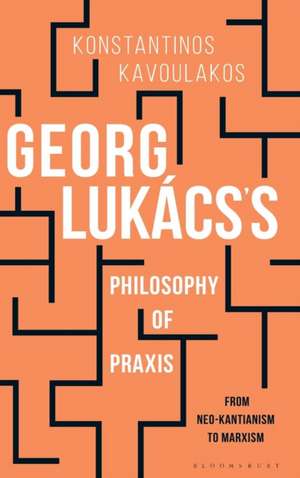Georg Lukács’s Philosophy of Praxis: From Neo-Kantianism to Marxism
Autor Associate Professor of Philosophy Konstantinos Kavoulakos Prefață de Andrew Feenbergen Limba Engleză Hardback – 19 sep 2018
Toate formatele și edițiile
| Toate formatele și edițiile | Preț | Express |
|---|---|---|
| Paperback (1) | 224.84 lei 6-8 săpt. | |
| Bloomsbury Publishing – 18 mar 2020 | 224.84 lei 6-8 săpt. | |
| Hardback (1) | 715.26 lei 6-8 săpt. | |
| Bloomsbury Publishing – 19 sep 2018 | 715.26 lei 6-8 săpt. |
Preț: 715.26 lei
Preț vechi: 1028.11 lei
-30% Nou
Puncte Express: 1073
Preț estimativ în valută:
136.90€ • 147.77$ • 114.79£
136.90€ • 147.77$ • 114.79£
Carte tipărită la comandă
Livrare economică 18 aprilie-02 mai
Preluare comenzi: 021 569.72.76
Specificații
ISBN-13: 9781474267410
ISBN-10: 1474267416
Pagini: 264
Dimensiuni: 156 x 234 mm
Greutate: 0.52 kg
Editura: Bloomsbury Publishing
Colecția Bloomsbury Academic
Locul publicării:London, United Kingdom
ISBN-10: 1474267416
Pagini: 264
Dimensiuni: 156 x 234 mm
Greutate: 0.52 kg
Editura: Bloomsbury Publishing
Colecția Bloomsbury Academic
Locul publicării:London, United Kingdom
Caracteristici
Contests the established interpretation, formulated by Adorno, of Lukács' early Marxist philosophy as an idealist, ultra-leftist theory of capitalism
Notă biografică
Konstantinos Kavoulakos is associate professor of Social and Political Philosophy/Philosophy of Culture at the University of Crete, Greece.
Cuprins
AcknowledgmentsAbbreviationsPreface by Andrew Feenberg 1. Introduction: The Need to Reconsider Lukács' Philosophy of Praxis First Part: Method2. The Problem of Content: a Neo-Kantian Theme 3. Flawed Philosophical Alternatives 4. Lukács' Materialist Theory of History Second Part: Theory 5. The Origins of the Concept of Reification in Lukács' Early Work 6. The Modern Form of Objectivity 7. What is Reification? Third Part: Praxis8. From Mystical Ethics to Transformative Praxis 9. De-reifying Capitalism10. Limits of De-reification11. Epilogue: The Significance of Lukács's Philosophy of Praxis Today ReferencesIndex
Recenzii
Providing a timely reassessment of Georg Lukács's History and Class Consciousness, Konstantinos Kavoulakos rescues the critical potential of Lukács's theory of reification and transformative praxis from its long-congealed history of misreading and mistranslation, letting us see it with fresh new eyes, and letting it speak to our own troubled times.
In its orientation toward social transformation and toward new experiments in the meaning of being human, Lukács's philosophy of praxis was too far ahead of its time. Its time has finally come, and Kavoulakos has given us an interpretation of Lukács's revolutionary Marxism that is a fit for this moment in history. His careful recovery of Lukács's neo-Kantian formation together with his meticulous reconstruction of the core arguments of the "Reification" essay make Kavoulakos's text a vital contribution to contemporary critical theory.
Kavoulakos's book is an outstanding piece of scholarship that shows, with deep insight, how Georg Lukács was able to give a unique philosophical foundation to revolutionary politics in "History and Class-Consciousness" (1923) by combining Neokantian and Hegelian concepts with the Marxist theoretical foundations. Lukács's philosophy of praxis is still relevant today and cannot be reduced, as so many critics have argued, to an "idealist" argument.
In its orientation toward social transformation and toward new experiments in the meaning of being human, Lukács's philosophy of praxis was too far ahead of its time. Its time has finally come, and Kavoulakos has given us an interpretation of Lukács's revolutionary Marxism that is a fit for this moment in history. His careful recovery of Lukács's neo-Kantian formation together with his meticulous reconstruction of the core arguments of the "Reification" essay make Kavoulakos's text a vital contribution to contemporary critical theory.
Kavoulakos's book is an outstanding piece of scholarship that shows, with deep insight, how Georg Lukács was able to give a unique philosophical foundation to revolutionary politics in "History and Class-Consciousness" (1923) by combining Neokantian and Hegelian concepts with the Marxist theoretical foundations. Lukács's philosophy of praxis is still relevant today and cannot be reduced, as so many critics have argued, to an "idealist" argument.
